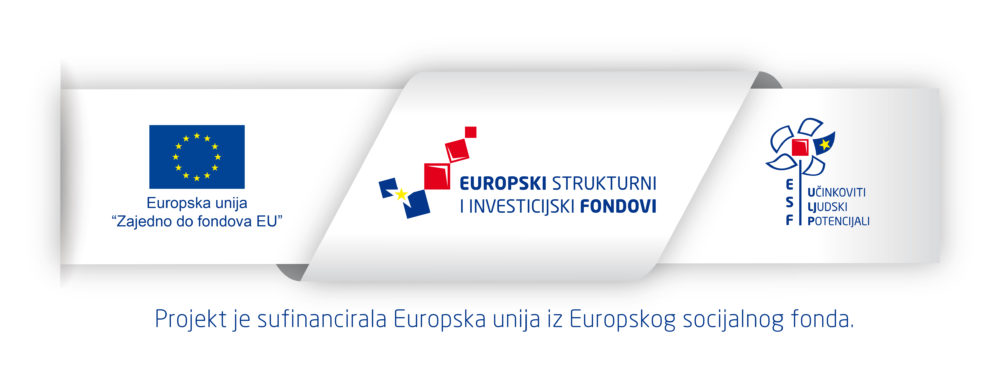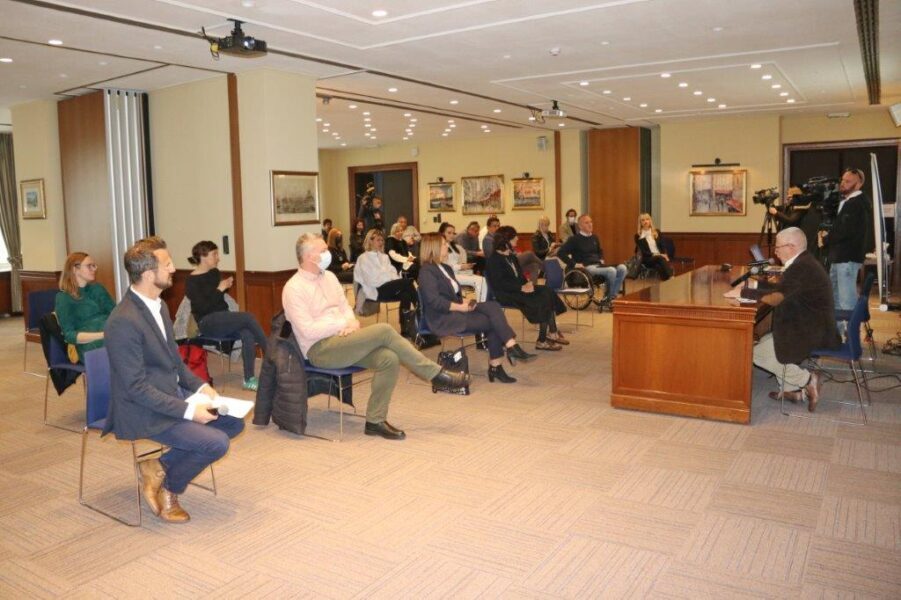
The New Path project was implemented with the partnership of the City of Rijeka, the Rijeka Social Welfare Centre, the Association for the Homeless and Socially Vulnerable People “Oaza” and the Homeless Shelter “Roses of St. Francis”.
The New Path project – development of an innovative programme for social inclusion of the homeless is aimed at re-socialising the homeless in all aspects of their lives with the aim of providing easier access to social services, providing psychosocial support, helping them move into the labour market and find their way among the regulations that lay down their various rights and obligations.
Homelessness, by its difficulty and complexity, is one of the main societal problems. FEANTSA (European Federation of organisations working with the people who are homeless) has developed a typology of homelessness according to which basic types are defined – roofless, without a flat/house, uncertain and inadequate dwelling.
This definition of the homelessness concept increases the number of the registered homeless people in the Republic of Croatia to several thousand citizens. Many of them are not literally on the streets, but they live in unworthy, insecure and inadequate conditions.
With the aim of better social integration of the homeless and people at risk of homelessness, the New Path project was implemented with the partnership of the City of Rijeka, the Rijeka Social Welfare Centre, the Association for the Homeless and Socially Vulnerable People “Oaza” and the Homeless Shelter “Roses of St. Francis”.
Funds for project implementation amounting to HRK 1,483,984.74 were fully provided through the invitation titled “Expanding the network of community based social services – Phase I” under the European Social Fund, Operational Programme Efficient Human Resources 2014-2020.
The project lasted for two years and in this period it fulfilled its goals, which are the reconstruction and equipment of the premises used as emergency accommodation of the City of Rijeka and the establishment of the Homeless Support Centre, launching a follow-up programme with the aim of strengthening homeless people with knowledge and skills, in order to be actively involved in community life and change their social status, implementation of a public campaign aimed at raising awareness of homelessness problems and implementation of additional training courses for professionals so that they can further work on the development and improvement of projects intended for the homeless and people at risk of homelessness.
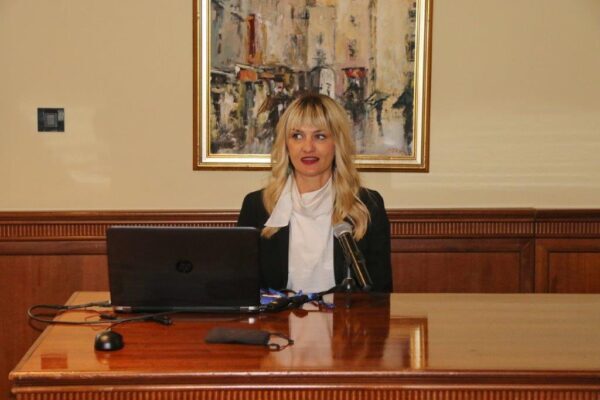
head of the Social Welfare Service, City of Rijeka and project manager, Maja Pudić
“In addition to assistance provided to the homeless, who are also the end users of this programme, owing to this project we also built capacities of the professionals who work with them. We have also equipped the Homeless Support Centre in the premises used as emergency accommodation at the address Antun Mihić 2G, which will continue to be used in the future. We wanted to create a place where, in addition to other services, such as legal aid, the homeless will be provided with psychosocial services such as various workshops aimed at including them in the city’s social life. We wanted to create a place where users can get all the necessary information from various aspects, and where, for example, assistance to children in school obligations would be provided” said the head of the Social Welfare Service at the City of Rijeka and project manager of the New Path Maja Pudić.
The objective of launching the Homeless Support Centre in the quarter where the homeless are located is to try to find an answer to the question – how to get out of the circle of homelessness, and also how to better learn to work with the homeless through training of professional associates implemented by the Centre.
The objective of the follow-up programme is to strengthening the homeless people with knowledge and skills, in order to be actively involved in community life and change their social status. This programme is implemented by a mobile professional team, operating at three locations. It consists of psychosocial support, educational workshops, and assistance to children who live in emergency accommodation of the City of Rijeka in school obligations.
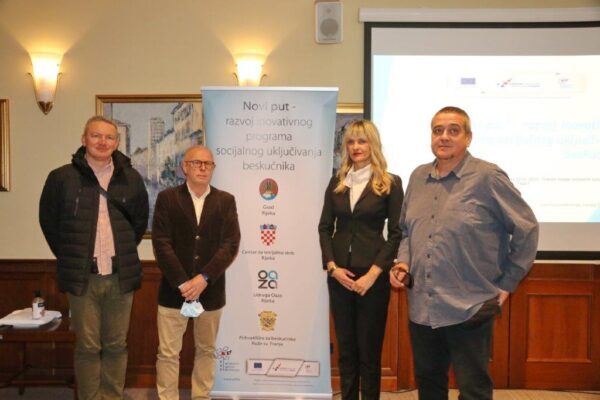
PJER ORLIĆ, GORAN PALČEVSKI, MAJA PUDIĆ and DRAGO LELAS
Pjer Orlić, a member of the follow-up team, pointed out that the project included almost a hundred users. “Owing to this project, cooperation between the homeless and us who have been working with them for years has been deepened and widened. The project enabled them to be provided with more opportunities, assistance and contents, a helping hand in their integration into society that they have accepted”, pointed out Orlić, adding that Rijeka has two shelters for the homeless. “Both “Roses of St. Francis” and “Oaza” have shelters that can accommodate 14 users at a time, there is also emergency accommodation of the City of Rijeka, but, unfortunately, there is a growing need for it”, concluded Orlić.
The project closing conference brought together professionals from Rijeka, Zagreb, Split, Osijek and Ljubljana who presented their work experiences and support models for the homeless.
Drago Lelas, president of the MoSt Association and president of the Croatian Homeless Network, said that he was satisfied that the project promotor of such a type of project was the City Administration. “In cooperation with local service providers, Rijeka has made a big step forward in social inclusion of the homeless,” commented Lelas.
Within the New Path project, a theatre play Black Wool was realised. The play was not performed and conceived only by professionals, but also by the homeless, i.e. people at risk of poverty.
Namely, world experiences show that participation in art programmes is a very effective way to strengthen marginalised groups. Through the experience of preparing a play, participants acquire skills, work habits and new knowledge, and gain trust and social connections. At the same time, this play will pose challenges to the audience, in terms of increasing awareness and sensitisation towards this social group defined by a number of specific features.
The Campaign aimed at raising awareness about homelessness is implemented during round tables and forums dedicated to beneficiaries – homeless people or people at risk of homelessness, and professionals who work directly or indirectly with the homeless or people at risk of homelessness, as well as during project closing events dedicated also to the general public. One of the elements of the campaign is the Guide for the Homeless, which will be published soon.
Education of associates was provided through various courses and study tours as well as continuous supervision during project implementation. Its objective is to improve their competencies enabling them to further work on the development and improvement of projects intended for the homeless and people at risk of homelessness.
In 2021, the City of Rijeka allocated overall about HRK 2 million as assistance to the homeless and people at risk of homelessness
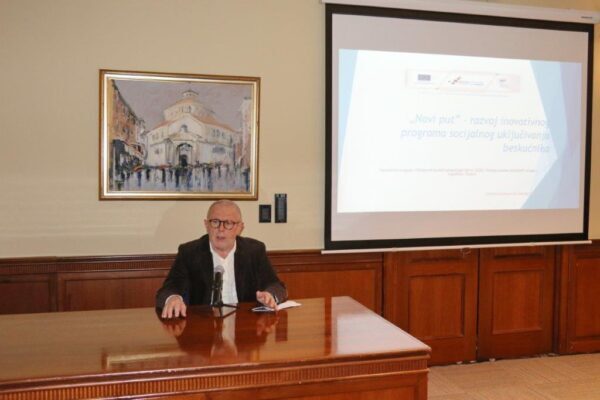
Goran Palčevski, deputy mayor
“21 years ago the City of Rijeka was the first city in Croatia that devised and launched a unique project of emergency accommodation as a form of assistance to the homeless and people at risk of homelessness. This project of taking care is an example of the most concrete help and represents the most socially sensitive and strongest answer to the problem that this specific group of citizens encounters, because such care primarily opens a possibility of using a number of social rights and benefits that they could not realise without an address where they reside, i.e. if they were not registered in the system and if they really lived only on the street”, said Goran Palčevski, deputy mayor of the City of Rijeka and added that the City of Rijeka had done a lot over the years to solve the problem of homelessness, but that there was also room for improvement. “First of all, I have in mind the models of social integration of the homeless, which we will further tackle,” concluded Palčevski.
The City allocates around HRK 739,000 per year for emergency accommodation, of which around HRK 479,700.00 is allocated for current maintenance of facilities, and HRK 260,000.00 for overhead costs and the costs of the emergency accommodation manager and implementation of psychosocial support to users. The City of Rijeka completely settles on behalf of the citizens who live in emergency accommodation the service of household waste collection, the utility rate and water bills for up to 5 m3 per month per family member and wastewater disposal, as well as 50% of the rental price of 1.84 HRK / sq.m. (e.g. for 16 sq.m. the user pays a rental fee of HRK 14.75 per month). Furthermore, they are also provided with assistance in settling electricity bills in the amount from HRK 150 to 400, depending on the number of family members.
Moreover, the City of Rijeka allocates about HRK 1.35 million every year for various care programmes related to the homeless and people at risk of homelessness.
The City financially supports the homeless shelters “Roses of St. Francis ” and the shelter of the Association “Oaza” and provided and ceded free of charge premises to the housing community for homeless women. Additional financial assistance of HRK 20,000 per year is provided for the project “St. Elizabeth’s Bread” promoted by the Solidarity Shop. With HRK 15,000 annually, the City of Rijeka also financially supports the activity of the “Depaul Croatia” Association, that in the territory of the city of Rijeka implements the project “Outreach work aimed at marginalised groups at their gathering places”. The members of this Association go to places where the homeless occasionally and constantly gather and in conversation with them, they offer them advisory assistance as well as the services of daily sojourn for the poor and homeless within the convent of the Sisters of Mercy “House of Refuge”.
The city finances the accommodation of people who find themselves in unfavourable life situations, especially women with children, in the premises of the City Association of the Red Cross Rijeka.
